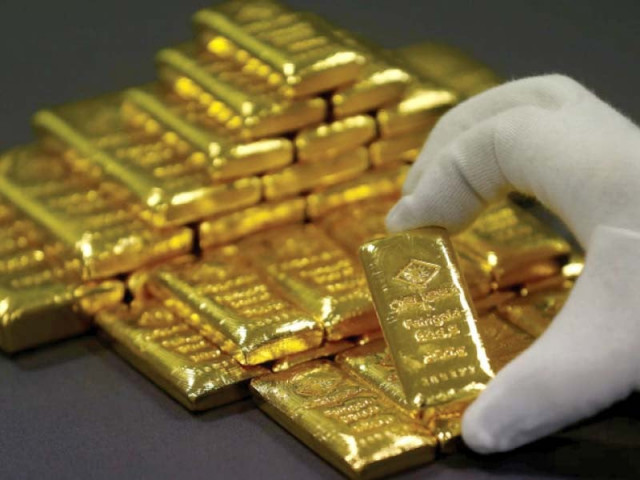Gold soars to one-month high
Middle East crisis sparks investment frenzy as price hits Rs214,600 per tola

As tensions escalate in the Middle East, a surge in gold prices is captivating the attention of investors concerned about the spillover effect of the war on global markets. Many are choosing to park their savings in the safe haven of gold to shield themselves from currency devaluation in their respective countries.
In Pakistan, the price of the precious metal reached a one-month high at Rs214,600 per tola (11.66 grams) on Saturday, in line with the global trend. The ongoing depreciation of the rupee has also contributed to the rising value of gold.
Gold has experienced a remarkable comeback, surging by almost 9% or Rs17,500 in the past three weeks, starting from a recent low of Rs197,100 per tola on October 13, 2023. The conflict between Palestine and Israel that erupted in early October, along with the rupee’s decline, has driven this increase in gold prices. AA Gold Commodities’ Director, Adnan Agar, noted, “Gold has spiked by around $200 per ounce to over $2,000 in recent days in the wake of the Middle Eastern crisis.” He highlighted that it was trading at approximately $1,800 per ounce for days and weeks before the war began.
Haji Haroon Chand Rahid, President of the All Pakistan Sarafa Gems and Jewellers Association, pointed out that the Israeli aggression against Palestine is one of the factors contributing to the surge in gold prices. He mentioned that the gold market is primarily trading on paper rather than investors taking physical possession of the commodity against payment. He expressed the belief that the value of gold would likely decrease once diplomatic efforts for a ceasefire succeed.
Agar discussed that gold had reached a “triple top” near its all-time highs, in the range of $270-280 per ounce (31.10 grams) in global markets about six months ago. The fact that gold prices revisited these levels for the third time suggests that it may have a strong basis for further increases if the Middle Eastern conflict escalates.
Agar speculated that the recent political actions by superpowers indicate that Israel may continue the war for the next six months, similar to Russia’s aggression in Ukraine. However, he clarified that this is not a full-scale war and is limited in scope. If investors were genuinely concerned about the war, the price of crude oil should have continued to rise, rather than dropping back to $81 per barrel, one day after touching a recent high of $93 per barrel.
He believes that the current pause in the conflict may lead to a correction of $50-60 per ounce from its current price of nearly $1,993 per ounce. If the aggression resumes and prolongs, the safe-haven may rise to $2,100-2,200 per ounce. However, if the war concludes due to ongoing global diplomacy, and peace returns to the region, gold prices would likely fall sharply to pre-war levels, around $1,800 per ounce.
Adnan Agar, whose firm is an active member of the Pakistan Mercantile Exchange (PMEX), partly disagreed with Chand and noted that many investors are buying physical gold, not just trading on the PMEX.
Chand cautiously projected that the price of gold may settle at around Rs218,000 to Rs220,000 per tola during the current crisis.
Experts have previously linked fluctuations in gold prices to the rupee-dollar exchange rate, as most of the precious metal is imported to meet local demand. Therefore, changes in the rupee-dollar exchange rate play a vital role in determining gold prices in the local market.
In recent weeks, the domestic currency has depreciated by 2.63% or Rs7.48, reaching Rs284.31 against the US dollar in the inter-bank market on Friday, compared to the recent three-month high of Rs276.83/$ recorded in mid-October.
It is estimated that 90% of gold demand in Pakistan is met through smuggling, with only 10% being officially imported. The government has recently initiated a crackdown against gold and foreign currency smugglers, leading to a recovery in both assets.
Published in The Express Tribune, November 5th, 2023.
Like Business on Facebook, follow @TribuneBiz on Twitter to stay informed and join in the conversation.


















COMMENTS
Comments are moderated and generally will be posted if they are on-topic and not abusive.
For more information, please see our Comments FAQ